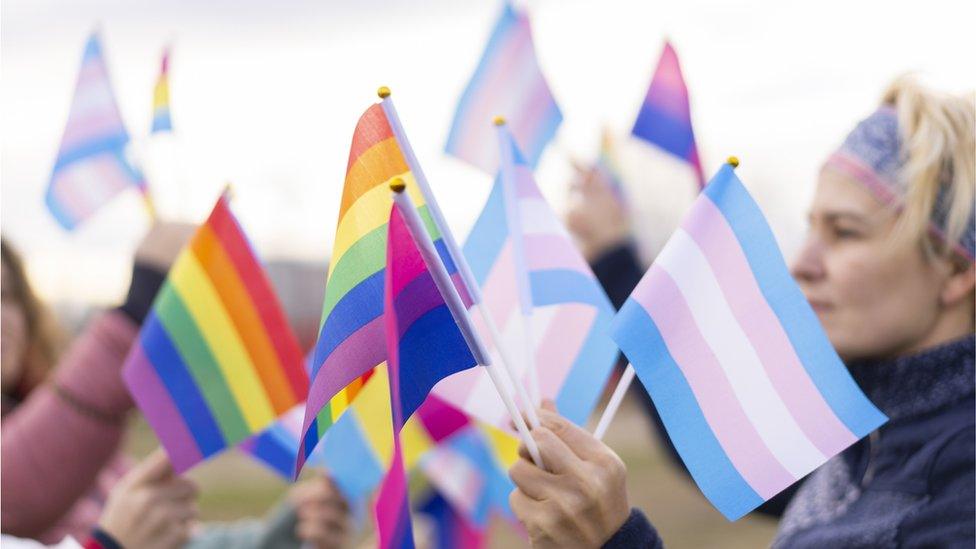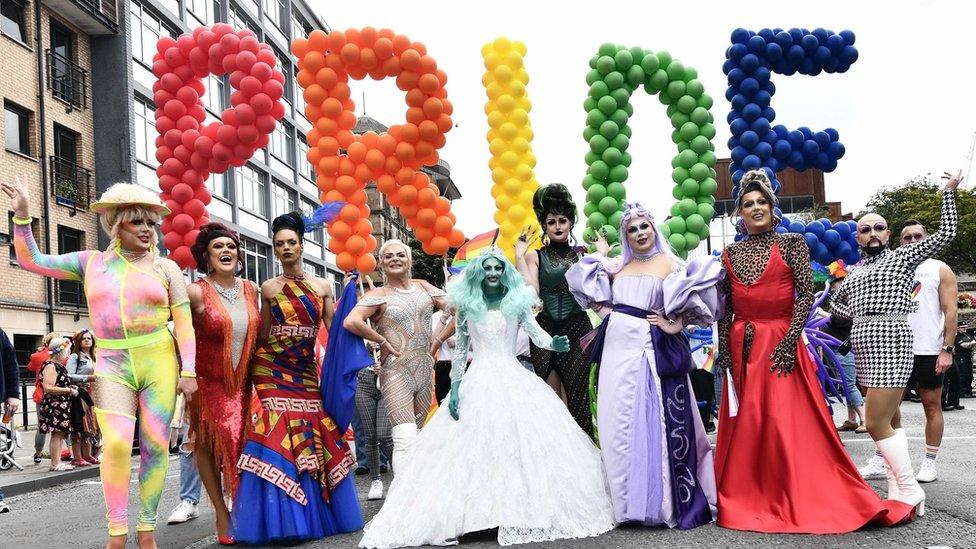Pride: Ulster Rugby excluded from march over transgender player policy
- Published

Ulster Rugby had applied to take in the annual Pride parade in Belfast on 29 July
Ulster Rugby will not be allowed to march in Belfast's Pride parade because of the ban on transgender women playing in female contact rugby games.
The organisers of the Pride parade said any group which was "engaging in trans exclusionary practices" would not be permitted to participate in the march.
Ulster Rugby is governed by the Irish Rugby Football Union (IRFU), which introduced the transgender policy.
The IRFU said it was disappointed but respected the decision.
It added that the move would "not affect the ongoing commitment of the IRFU to supporting the LGBTQIA+ community".
'Physical differences'
In August 2022, the IRFU said only rugby players whose sex was recorded as female at birth would be allowed to compete in the female category.
At the time, the IRFU said its ban was based on "medical and scientific evidence".
It said there were "physical differences between those people whose sex was assigned as male and those as female at birth".
The IRFU added that "advantages in strength, stamina and physique brought about by male puberty are significant and retained even after testosterone suppression".
The Belfast Pride Festival celebrates and campaigns for LGBTQIA+ rights and has grown in popularity over the past five decades.
The theme of this year's festival is "stand by your trans".
Ulster Rugby was one of many organisations which applied to take in the annual Pride parade through the city on 29 July.
Following its exclusion, Belfast's Pride organisers described their festival as "unapologetically trans inclusive".
"Trans, non-binary and gender-diverse people have helped lead and shape not only the Pride movement, but the wider LGBTQIA+ civil rights movement, and are an integral part of our community and wider society," they added.
"We believe trans, non-binary and gender- diverse people should be supported, accepted and celebrated within families, communities and across wider society."
Ulster Rugby took part in the parade in 2022.
Allow X content?
This article contains content provided by X. We ask for your permission before anything is loaded, as they may be using cookies and other technologies. You may want to read X’s cookie policy, external and privacy policy, external before accepting. To view this content choose ‘accept and continue’.
In a statement to the BBC's Talkback programme, the IRFU said its gender participation policy was "in-line with World Rugby guidance, which is subject to ongoing review".
The IRFU has different rules for transgender women and transgender men who wish to compete in contact rugby games.
It explained that in the male category, "players whose sex is recorded at birth as female may continue to play if they provide written consent and a risk assessment is carried out".
However players whose sex was recorded as male at birth cannot play as part of women's teams in contact games.
"It is important to point out that we have non-contact playing formats, refereeing, coaching and volunteering opportunities available to all, including players impacted by the policy change, to encourage continued involvement in the game," the IRFU added.
"We recognise that this is a sensitive and challenging area for those involved, and the wider LGBTQIA+ community, and our collective aim is that trans, non-binary and gender non-conforming people who support and play our game will remain within the rugby family."
'Not inclusionary'
Fiona McAnena, director of sport at the campaign group Fair Play For Women, said the transgender rules were about protecting players and protecting the integrity of competitions.
"In order to include women safely and fairly in sport - especially in rugby - you have to exclude male bodies from the women's teams and that's what the rugby football union have decided to do," she told Talkback.
However Leo Lardie, from the LGBTQIA+ campaign group Rainbow Project, said the policy was not inclusionary because it was "forcing women to play with men".
"And I think the issue here is that many people assume that transgender women are all of the same height, of all the same weight, all have the same muscle mass, and that is just categorically not true.
"You're disallowing them to have that kind of camaraderie and that kind of sportsmanship with their players."
The IRFU is the governing body for rugby in Ireland, including four professional rugby teams representing the Irish provinces of Ulster, Leinster, Connacht and Munster.
In 2022 Leinster Rugby was excluded from participation in the Dublin Pride parade over the same issue.
Dublin Pride organisers told BBC News NI: "We spoke with Leinster Rugby/IRFU in 2022 and found their views did not align with our own and informed them that they would not be permitted into the parade last year.
"As their views had not changed, they did not apply this year."
Related topics
- Published30 July 2022
